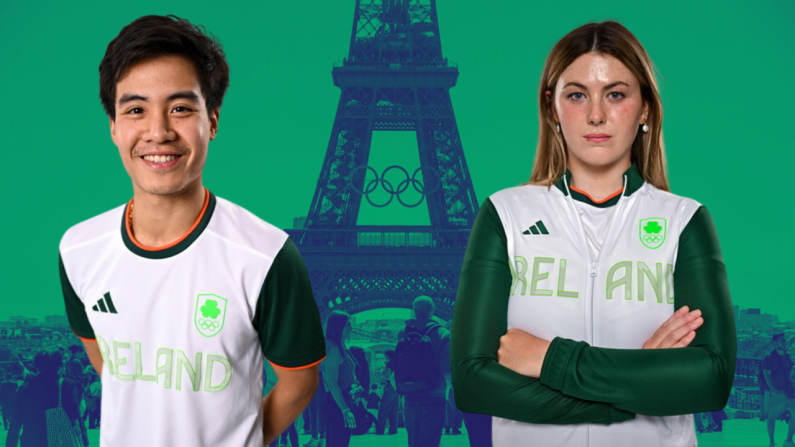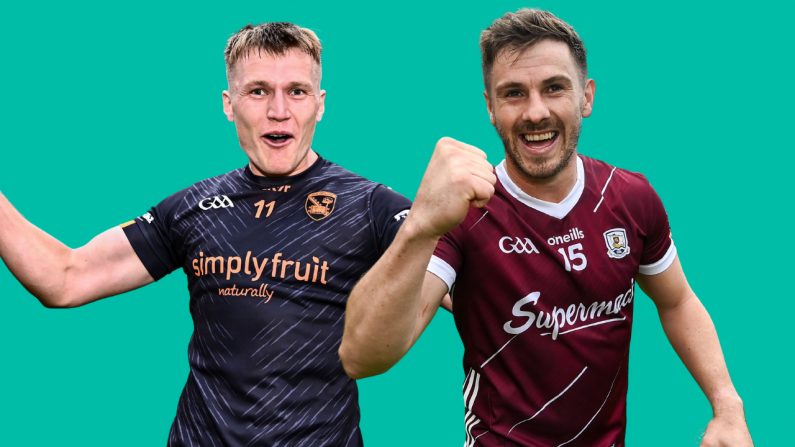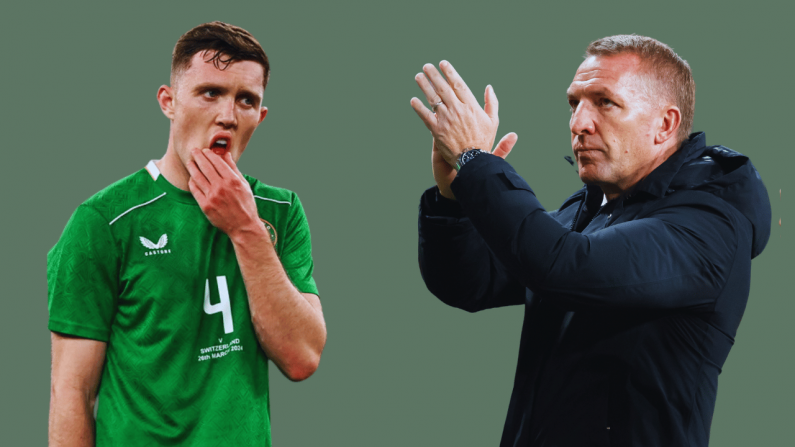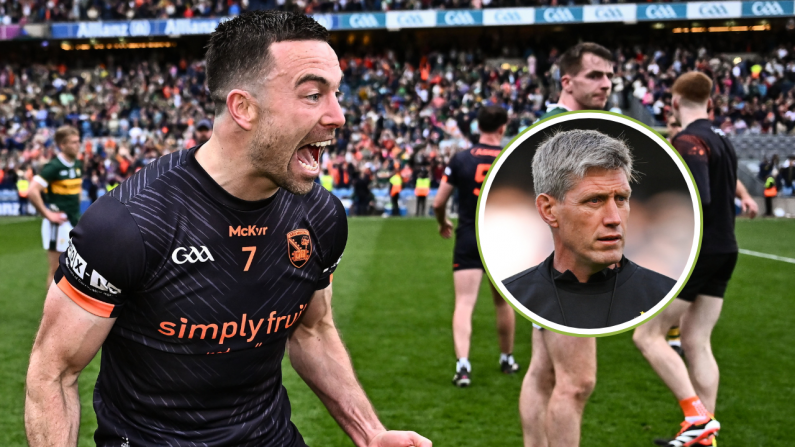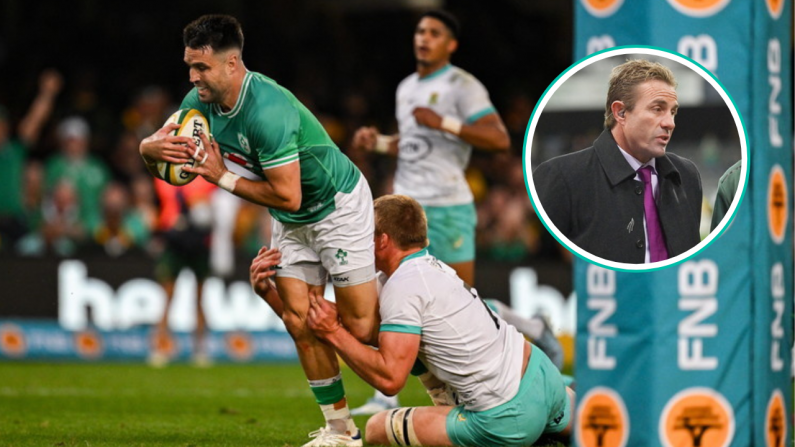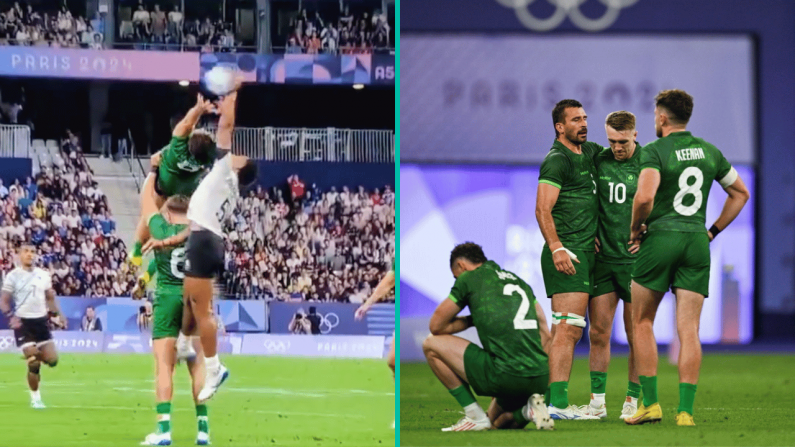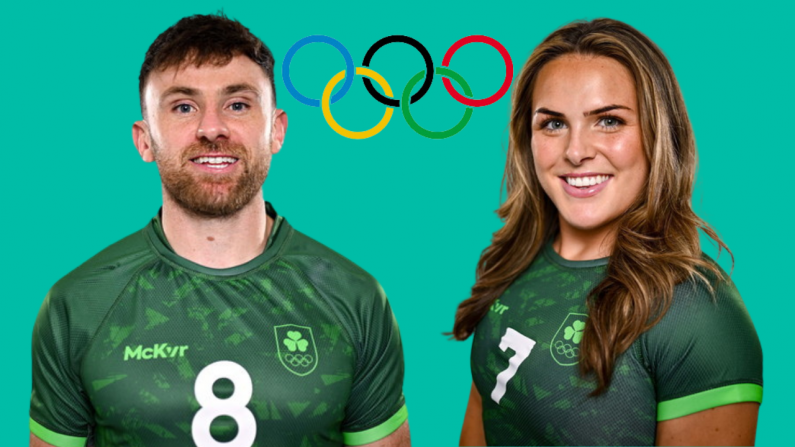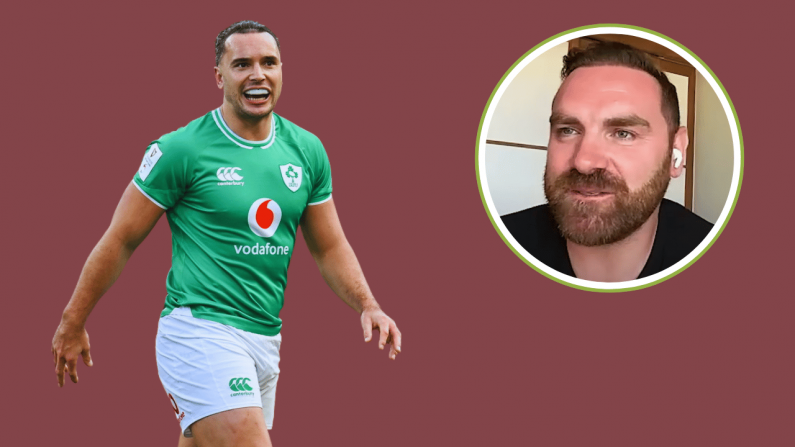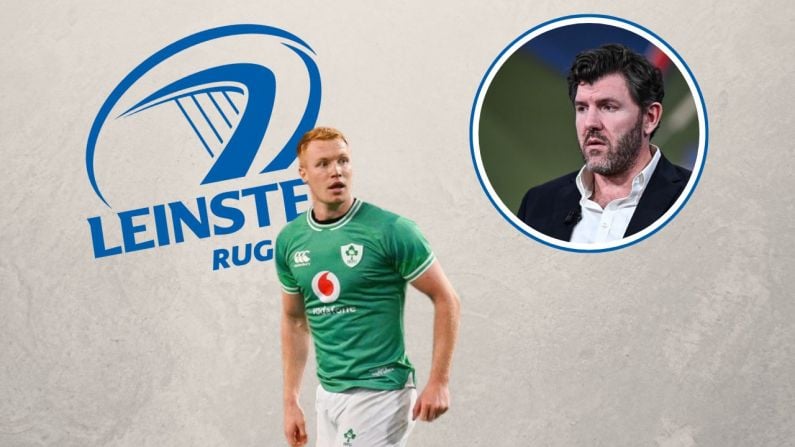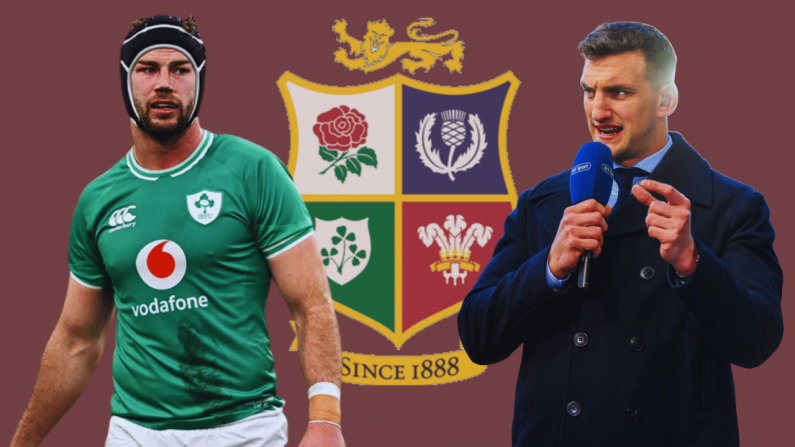Danny Barnes remembers sitting in the Thomond Park dressing room, reading the match programme, seeing his name across from Brian O'Driscoll's and laughing.
He was just nine games into his pro rugby career, about to start a Celtic League final, and he was the Munster counterpart to Ireland's greatest ever player. It was a pinch-me moment, like a young Irish actor about to step onto the same set as Richard Harris.
Stage fright didn't hit Munster that day. They beat Leinster 19-9 in front of 26,000. That game, the 2011 Celtic League final, remains the last time Munster won silverware.
"Some lads go through their whole careers without winning anything - I managed to do it quite early," Barnes tells Balls.
Two years later, Barnes's Munster career was over. Three years after that, his pro career was done. Four years on from deciding not to pen another pro contract, he's happier than ever.
Barnes was born in Auckland, son to an Irish mother and a proud Kiwi father. They moved to Kerry - specifically the village of Ardfert five miles outside Tralee - when he was eight.
He played hurling and football but he was a fish on a bike - rugby was his pond. He started playing with Tralee rugby club at U11. That he'd already had a grounding in the game, learning how to tackle and pass with Massey in Auckland from age five, had him out of the starting blocks ahead of others in the field.
"My dad started coaching us from U12 or U13 all the way up to U18 when I left," says Barnes.
He was always really tough on me. He never made me captain. He'd always punish for being late, give me extra laps. He did that on purpose to show there was no favouritism.
When I was younger I didn't notice but when you're a teenager, you're like, 'What the hell?' We had our moments. We used to have scuffle where he'd join in training and I'd try to get payback and take him out. It was good times looking back.
Eddie Barnes went on to coach the Tralee senior team and became a Munster development coach. He played a major part in the early career of another Tralee product: Connacht and Ulster second row Ultan Dillane.
A decade ago, getting spotted as a rugby player in Kerry was like being a fine dining restaurant in a back alley: You might have Michelin potential but it's hard to get that star if no one's walking past.
Danny was advised he should change schools for his Leaving Cert year. And so he did, departing the CBS Green in Tralee (where students mostly played rugby "just to get out of class") and headed for the rugby main street of St Munchin's in Limerick. Looking back now, Barnes believes he could have had the career he did even without that switch.
2009 was when he started to believe rugby could be more than a hobby - it could be a career. The centre played for the Ireland U20s at the World Championship in Japan and he accepted a place in the Munster Academy. His days in the sub-academy, gigging for a record deal, were over.
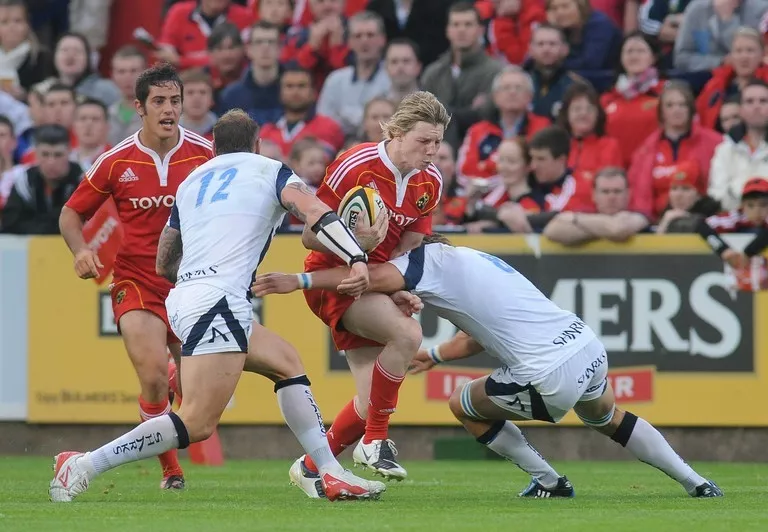
14 August 2009; Danny Barnes, Munster, is tackled by Lee Thomas and David Tait, Sale Sharks. Pre-season friendly, Musgrave Park, Cork. Picture credit; Diarmuid Greene / SPORTSFILE
"I was 18 or 19 and training with Paul O'Connell, ROG, Doug Howlett," says Barnes.
"It's super intimidating at the start. I was probably a bit of a shier kid anyway. I worked hard in training and they saw I was working hard, that's how you win those lads' respect. Doug Howlett was awesome. He was an absolute gent."
At that time, Munster was still operating out of two bases: Cork and Limerick. Barnes was situated in the former where he was studying civil engineering. Those studies lasted for a year-and-a-half before he deferred them until later in life when he would have to think about making a living from a pursuit other than rugby.
To others looking in, the Munster set-up was unusual, as if they'd decided to dine at opposite ends of a long table when everyone else in the room was sitting close and conversing. Cork-based players travelled to Limerick on Tuesdays and Limerick-based players to Cork on Thursdays. In between, they trained at their own bases.
It was all Munster knew at the time. They'd won two Heineken Cups in the previous three years. Could that have been more had they not been shouting at each other from opposite ends of the room? It wasn't until several years later that the province realised they were operating with an old Nokia and the rest of the rugby world had iPhones in their pockets.
Barnes made his Munster senior debut on the wing against Connacht at the Sportsground in April 2010. On the opposite wing, also making his debut, was Simon Zebo. They won 18-12 with Paul Warwick orchestrating.
Tony McGahan, who joined two years earlier when Declan Kidney took the Ireland job, was the man who gave Barnes his debut.
"A crazy Australian," Barnes says of the head coach.
Typical: Loud, shouting, effing, blinding. Dumper was sound. We had a good relationship. He was tough. Like with some of the senior players, if you worked hard and were tough and physical in training and games, he respected you.
When I first met him, I was scared of my life, as were most of the lads. I remember the first day of training - I got called up randomly to come up to a training session - we were doing a pillar, post, pivot defending around a ruck.
I had my feet pointed in the wrong direction. They were supposed to point out and I had them pointed in. It was a very small detail but he lost his head, threatening to kick me off the field, 'Get out of there, if you do it again I'll effin get rid of you'. I didn't get that positioning wrong again.
In that situation [that style of coaching worked] but it wasn't always the best. I suppose he softened a bit with me as we built a relationship. He still always had a fiery side.
It was the end of the following season when Barnes's career hit the accelerator. He started the final three games of 2010/11. The second of those - just his fourth start for Munster - was the Magners League semi-final against Ospreys in Limerick. Playing outside Lifeimi Mafi, he touched down for two tries in an 18-11 win.

14 May 2011; Danny Barnes, Munster, is tackled by James Hook, Ospreys. Celtic League semi-final, Thomond Park, Limerick. Picture credit: Matt Browne / SPORTSFILE
Leinster, a week after they came from 16 points down at half-time to beat Northampton in the Heineken Cup decider, were the opponents in the final. Munster dented the celebrations.
"That was a good feeling - we'd stopped Leinster from doing the double," says Barnes.
His was a career which seemed to be on the rise. He signed a two-year pro contract that summer. In hindsight, his time as a rugby player had already reached its apex.
The 2011/12 season saw Munster knocked out in the Heineken Cup quarter-finals and reach the Pro12 semi-finals. Barnes started 12 games, making 20 appearances in all. He was playing games and developing.
Midway through that season, it was announced that McGahan would be leaving to become Australia's defence coach. It was a body blow for the then 22-year-old Barnes.
McGahan was replaced by a New Zealander, Rob Penney, and another Kiwi, Simon Mannix, joined as attack coach. They had different ideas to the departing Australian. In their jigsaw, Barnes didn't fit. He started just a single game.
"I loved defending more than anything," Barnes says of the type of player he was at the time.
I had good organisation. I never saw myself as a Keith Earls with that blistering pace. I was still quite a raw player. I hadn't been fine-tuned just yet.
When Penney came in, he changed the whole plan of how Munster played. We went from getting stuck in physically, being a classic Munster team, to throwing the ball around a bit more. Maybe that didn't suit me as much.
It was super frustrating. Simon Mannix, he had different views to Tony and I didn't really get that guidance or little bit of nurturing which I would have hoped for.
A few months before his contract was due to end, Barnes got a call from Munster CEO Garrett Fitzgerald.
"Garrett called me into the offices in Musgrave," says Barnes.
"I wasn't fully sure what the chat was [going to be about]. Rob Penney hadn't said anything to me. Simon Mannix hadn't said anything to me.
"I was still hopeful that I might even sign a one-year deal, give me an opportunity to continue. Munster was my home and I wanted to stay there and progress, build on my appearances. I had a good few caps at that stage.
"For them to say the words, 'Look, we're not renewing your contract for next year. Thanks very much for what you've done', it was a bit of a kick in the teeth.
"I was gutted. Rugby is so fickle, anything can happen and you're only as good as your last game. Just what happened in the year before and that 2011 final, it meant nothing - I was always aware of that."
Between signing that pro deal two years earlier and being told be was not staying with Munster, Barnes had switched agent. His new one had a couple of players at Newcastle.
"He organised a visit, for me to come over and see the club, meet Dean and the coaching team," Barnes says.
"That happened pretty quickly once Munster said they weren't keeping me on.
"Peter Stringer was on loan there for a few months the season before. I gave him a bell and asked what he thought of the club. He only had good things to say about it.
"I'd always been at Munster and always had my family only an hour or an hour-and-a-half away. I wasn't just going to a new club, I was going to a new country, getting an apartment, doing all that stuff."
Barnes was not the only new player to join Newcastle that summer. The Falcons had just been promoted back to the Premiership. An army of new recruits arrived but the 23-year-old played regularly and Newcastle avoided relegation, finishing second from bottom just six points above the descending Worcester Warriors.
In a sport which demands so much of a player's body, the questions which injuries had asked of Barnes had been easy to answer. That was until a knock he'd sustained three years earlier reemerged like a weed waiting for its chance. It was an elbow injury, the only real bad one of his career, which cost him dearly with Newcastle.
"I had dislocated my elbow at Munster a few years back, maybe in 2010," says Barnes,
"When I went to Newcastle, one of my first games we were playing Sale, I didn't dislocate it but I damaged it again. I ended up getting injections and trying to heal it that way. That occurred a couple of times throughout that season. It was stuttering me a little bit.
"The next year, I was having more issues with it, getting a bit frustrated. There was a lot of competition in the team as well at that time.
"Although I didn't want to do it - I knew my contract was going to be up - I ended up having to get surgery on it. I had to get a ligament reconstructed to fix it. I missed a good chunk of that second season at Newcastle. It wasn't ideal going into negotiations having had surgery.
"Dean just called me into the office. He was looking at other players. We were talking pretty frankly and openly about it. We didn't renew that contract with Newcastle.
"It was nothing compared to when I left Munster. Newcastle's not a homegrown club, there's a big turnover of players - there were boys coming and going throughout the season. I was injured and half thought about it, that I was damaged goods, haven't played too much, that there was a chance he might not keep me on.
"I wasn't overly disappointed. I'd just had the surgery, I had a new elbow and a new challenge wasn't going to be the worst thing for me."
What followed was the final season of his professional rugby career.
Barnes and his agent had a chat. It was decided that with suitors not lining up, a year in the Championship would be beneficial to get some game time and restock his CV with match footage. He joined West London side Ealing Trailfinders who had just been promoted to English rugby's second tier.
"It's so funny," says Barnes, "you're playing in a Magners League final to a couple of seasons later not having a list Premiership or Pro12 clubs interested. That was quite difficult to take."
The Ealing squad covered a broad spectrum of the rugby population. There were part-time players, many of whom worked as personal trainers during the day; young players looking for game time; young players who came through the Ealing academy; and then injured players like Barnes aiming to reboot their careers.
"The Champ can be gruelling," says Barnes.
It's not as fast-paced as the Premiership but like the Premiership, it's really physical. That's one thing I noticed coming across from Munster, because there's relegation, every game is an absolute slog, whether you're at the top or bottom. Most teams have massive packs, big men everywhere.
Sometimes in a game, you want to be able to relax and enjoy it but going into every game it was, 'We have to win this. We have to get something from this. We're getting closer to that dropzone'. All of a sudden, we were in a dogfight with Moseley. Every game was tough, just trying to stay alive and survive.
Financially, it can be tough in the Champ. It's not as good as the Prem but you're putting your body under the same pressure and strains; there's still the same risk of injury if not more because you don't have the same medical care. Some boys go for years on end and I've got massive respect to them to be able to do that.
Before Barnes joined Ealing, he and his wife laid out a plan for the medium-term: Get fit. Get the elbow right. Play games. Play well. Get promoted or get a move to a Premiership or Pro12 team.
The first half of the plan was executed, the second half was not. He'd come to a crossroads.
"As the season went on, I was struggling and my form wasn't as good as I'd have liked it to be," Barnes says.
"I didn't have many options club-wise. There were few Championship clubs interested and one or two opportunities in France.
"At that stage, I was just getting frustrated. Since I'd left Munster, each year just went down a little bit and it was eating away at you a little bit, some things were in my control, some things weren't in my control. I didn't want to do another year in the Champ, putting my body through that.
"I was just mentally drained from it. When rugby was going well for me, it was unbelievable, it was the best thing ever. When rugby doesn't go well, people don't see it, the other side of the coin.
"When you're not getting picked or a coach not liking you, or he doesn't rate you - that's tough. Injuries can be even worse - you're completely out of the loop with no interaction, you're doing your own thing. It has a toll on a person.
"Talking to my dad - he put so much time and effort into my career and development when I was a young fella - he just said, 'Look, you've got to do what makes you happy but you're 26, you don't want to be doing this when you're 36'.
"The chances of going back up were a lot lower. I could have kept chipping away at the Champ for another fives years but then your body is beaten up. Then you're in your 30s and you're having to start from zero to get a career or get into school. Having a family at that stage, all of those things were in my head.
"It was tough, but my old man said, 'In five years time we'll have a chat about this and I bet you that you'll thank me for advising you this way'. I hate to admit when he's right but looking back now, it's definitely the right decision."
At 26, Danny Barnes was done with professional rugby, though not the game. His agent jettisoned, he began searching for somewhere he could play semi-pro - he didn't want to go cold turkey.
Chinnor, a club based in the town of Thame just east of Oxford, was his nicotine patch. They helped him get a job and four seasons on - with the club now just a rung below the Championship - Barnes is still there, though he's unsure about the future.
https://www.youtube.com/watch?v=lcJYBq74DjM
"Rugby is your full-time job and you're constantly worried about contracts; it's your livelihood and you pay the bills with it," he says.
"When it comes down to negotiating contracts, unless you're an international, it can be quite a full-on time.
"Going to semi-professional, I had some income from rugby but my main earnings were from my job. Those first couple of seasons, I was back to having fun and it was like being home growing up in Tralee and literally just playing because you loved the game and had the craic with the boys."
There are days when Barnes looks back and feels he didn't drain every drop from the tank of his rugby career, but there's also the thought that it doesn't matter, that he might not have got where he is - happy with his family - if he'd ran it to empty.
"It's funny looking back," he says.
"I remember when Scott Deasy retired, he was an unbelievable player, one of the most skilful players I've ever seen. He finished full-time when I left Munster in 2013. I could never understand his logic because he's such a good player.
"Looking back now, with me finishing and seeing the importance of getting into a career and obviously life after rugby, I have a better understanding of things like that.
"The thing with rugby, a lot can depend on one person and their impression of you. I've spoken to a few boys about this who had a similar situation. You just want to get that control back. I'm a lot happier now.
"Some people think you're mad finishing rugby - people said that to me. It's just a bit more stability and consistency. You're not up and down. With rugby, the highs and lows are so great.
"Something I've found over the last few years is that rugby is such a bubble. You're in it and that's all you think about, that's all you know, it's your whole life; you get really caught up in it and engrossed in it whereas now there's so much more whether it's work or family, being able to travel more. There's so much more to life than just rugby."
Featured image credit: Matt Browne / SPORTSFILE



